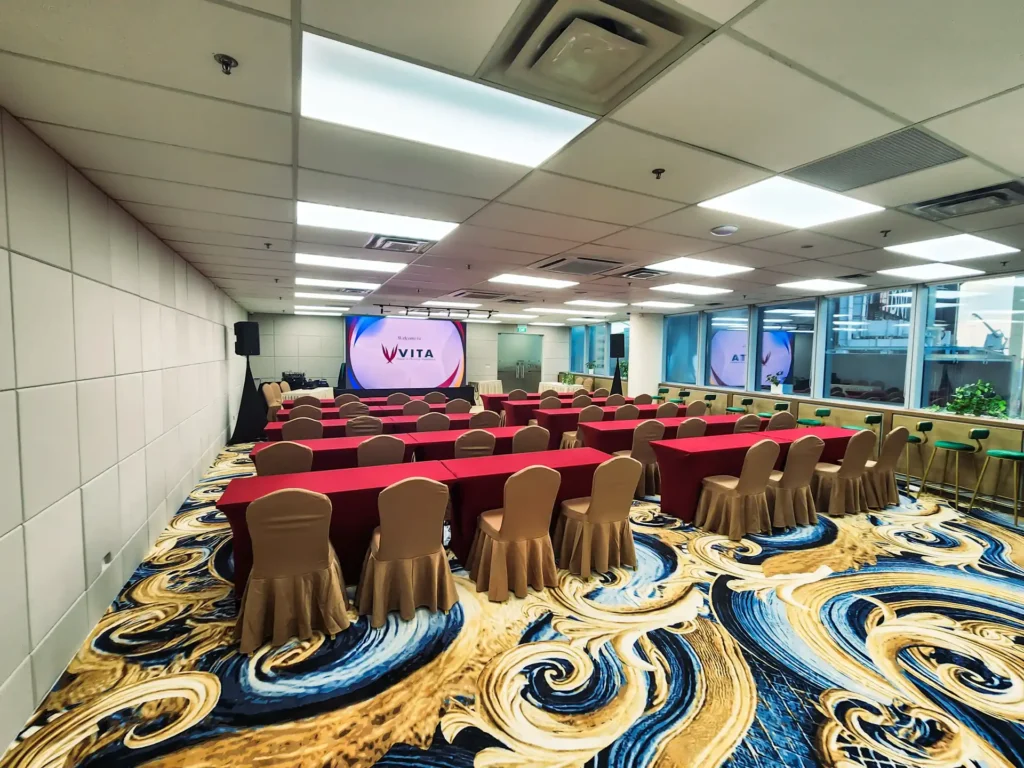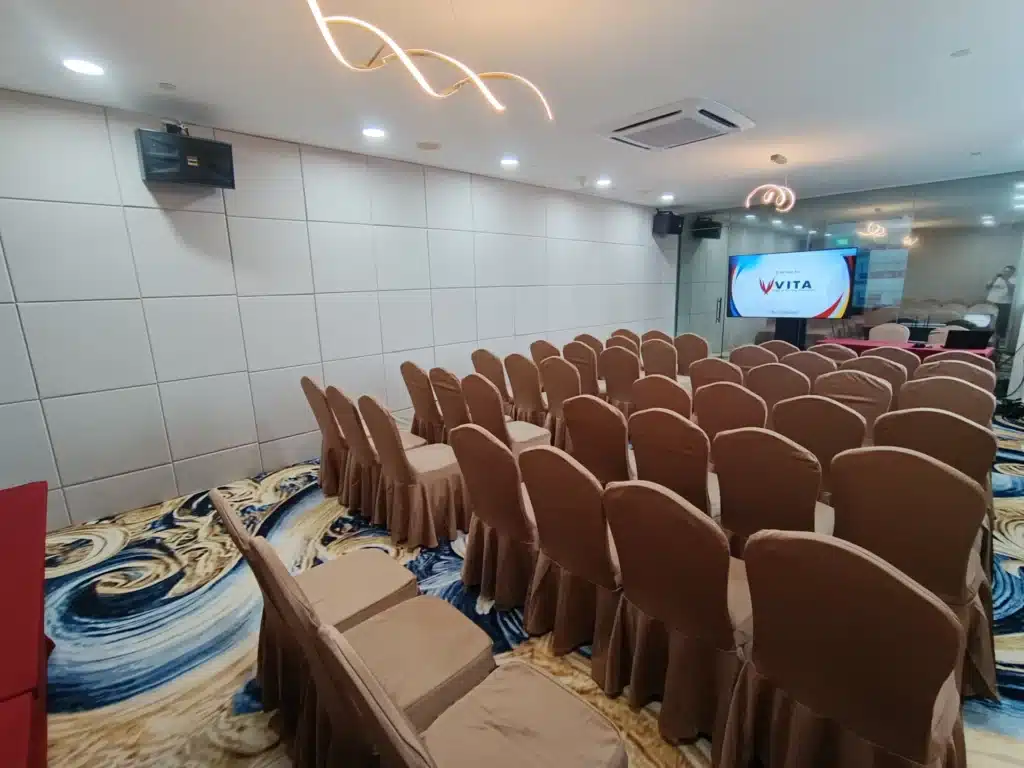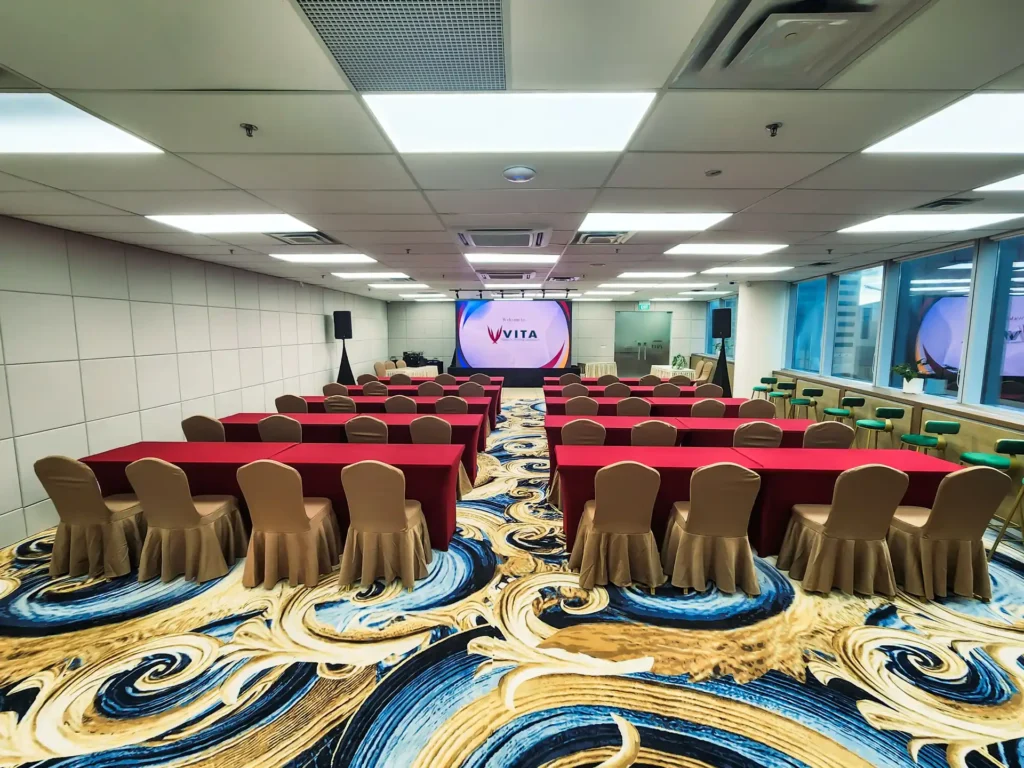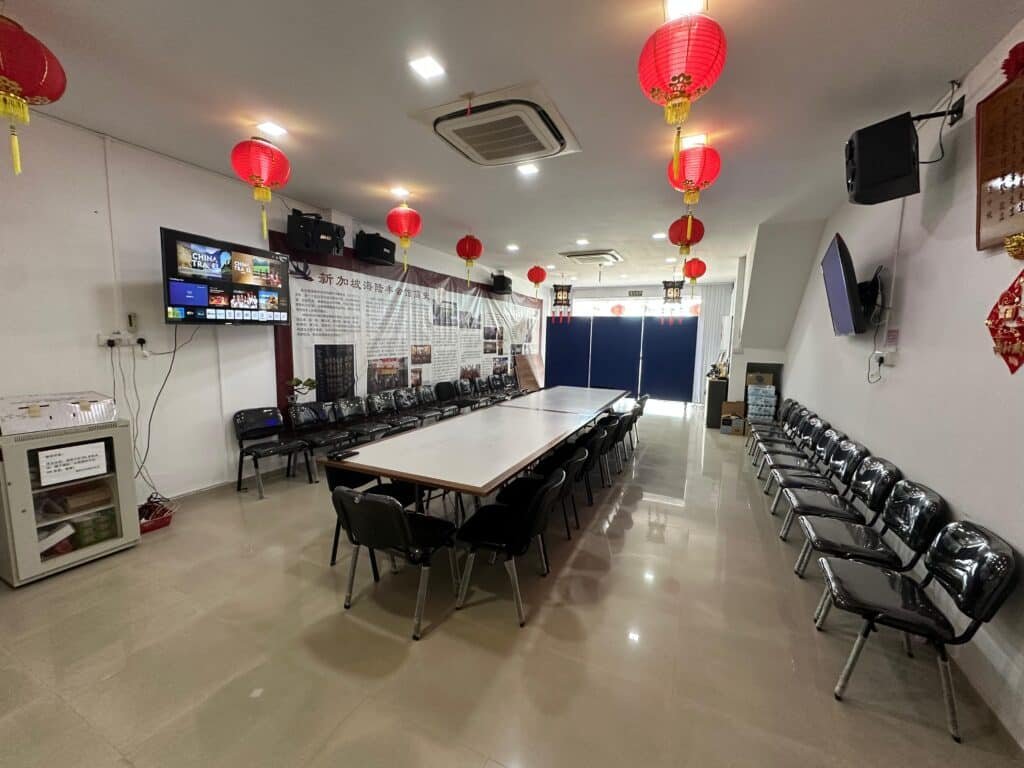How to plan a corporate seminar is a core challenge for companies that want to deliver impactful learning and networking experiences. A corporate seminar goes beyond a simple meeting, it is an event designed to inspire employees, build leadership skills, enhance collaboration, and align teams with organizational goals.
At Vita Venue, we specialize in helping businesses run successful seminars in Singapore’s Central Business District. With years of experience in hosting corporate training, workshops, and conferences, we know exactly what makes a seminar effective, engaging, and memorable.
Why Corporate Seminars Matter in Modern Business

Corporate seminars have evolved into strategic tools for company growth. They are not just for information delivery; they build connections, foster culture, and accelerate innovation.
Some key benefits include:
- Professional Growth: Employees gain new skills, insights, and confidence.
- Team Cohesion: Group learning strengthens relationships and collaboration.
- Thought Leadership: By bringing in industry experts, companies position themselves as forward-thinking.
- Employee Retention: Training and seminar opportunities make employees feel valued, improving loyalty.
According to a Deloitte Insights study, companies that invest in structured learning events are 92% more likely to innovate successfully than those that do not.
Step-by-Step Framework: How to Plan a Corporate Seminar
1. Define the Purpose and Objectives
A seminar without clear objectives risks being unfocused. Begin by identifying:
- Core Purpose: Training, strategy alignment, or knowledge sharing.
- Target Audience: Senior executives, managers, or all staff.
- Desired Outcomes: What skills or knowledge should attendees walk away with?
Example: If the goal is to train a sales team on negotiation strategies, the seminar should focus on interactive workshops, role-playing, and case studies.
2. Develop a Realistic Budget
Budgeting is more than just booking a room. Consider these essential cost categories:
- Venue rental (half-day or full-day packages)
- Catering (breakfast, coffee breaks, lunch, or cocktail receptions)
- Audio/visual equipment (projectors, screens, microphones, Wi-Fi)
- Speaker fees and travel costs
- Branded materials (banners, workbooks, digital packs)
- Marketing and registration platforms
Tip: Build in a contingency of at least 15% to cover last-minute requirements like additional seating, printing, or technical support.
3. Select the Right Venue
The venue sets the tone for the entire event. In Singapore, professionals prefer locations that are accessible, modern, and fully equipped.
Key Venue Criteria:
- Location: Within the CBD, close to MRT stations.
- Flexibility: Configurable spaces for lectures, breakout groups, or networking.
- Comfort: Proper lighting, ergonomic chairs, and good acoustics.
- Amenities: Pantry, catering, and technical support onsite.
To see an example of a premium option, explore our Training Room Rental in Singapore CBD.
4. Secure Expert Speakers and Facilitators
The speaker lineup can make or break your seminar. Choose professionals who can:
- Provide fresh insights based on real-world experience.
- Deliver content in an engaging and interactive style.
- Connect with the audience by tailoring their message to company challenges.
Case in point: A tech company that hosted a seminar on “AI in Business” saw participation increase by 40% simply by bringing in a recognized industry leader as keynote speaker.
5. Build a Structured Agenda
An effective agenda balances knowledge delivery, interaction, and networking.
Example structure:
| Time | Activity | Purpose |
|---|---|---|
| 9:00 – 9:30 | Registration & Networking | Create rapport |
| 9:30 – 11:00 | Keynote Session | Inspire & inform |
| 11:00 – 11:15 | Coffee Break | Recharge |
| 11:15 – 12:30 | Workshop | Skill application |
| 12:30 – 1:30 | Lunch | Relationship building |
| 1:30 – 3:00 | Panel Discussion | Multiple viewpoints |
| 3:00 – 3:15 | Break | Relax |
| 3:15 – 4:30 | Strategy Session | Action planning |
| 4:30 – 5:00 | Wrap-Up | Consolidate learning |
6. Drive Engagement with Pre-Seminar Promotion
Even the best seminar falls short if attendance is low. To maximize turnout:
- Send personalized invitations to targeted participants.
- Create a LinkedIn event page to attract professionals.
- Use internal communication channels such as intranet and newsletters.
- Encourage leaders to personally endorse the seminar to increase interest.
7. Prepare Materials and Technology in Advance
Avoid last-minute panic by ensuring that:
- Presentation slides are tested and formatted consistently.
- Backup laptops and USB drives are available.
- Name badges, workbooks, or QR-code access guides are ready.
- Wi-Fi credentials and logins are displayed clearly for attendees.
8. Run a Full Rehearsal
A rehearsal is not optional. Gather speakers, test microphones, adjust lighting, and walk through the program. This ensures smooth transitions and gives confidence to the event team.
9. Capture Feedback and Measure Success
The seminar’s success must be evaluated with structured feedback. Collect:
- Ratings on speaker effectiveness
- Insights on content relevance
- Suggestions for improvement
- Net Promoter Score (NPS) to measure attendee satisfaction
According to industry benchmarks, a seminar with an NPS of +50 or higher is considered highly successful.
Real-World Example: Seminar Success at Vita Venue
A financial services company recently held a one-day leadership seminar at Vita Venue. With 80 participants, the event featured keynote talks, breakout workshops, and networking lunch. Post-event feedback revealed:
- 93% of participants rated the venue as excellent.
- 87% felt the seminar exceeded their expectations.
- Several attendees reported immediate implementation of strategies discussed.
This demonstrates the impact of combining a strong agenda with a supportive venue.

Conclusion: Mastering Corporate Seminar Planning
Planning a corporate seminar requires strategy, structure, and the right environment. From defining objectives to measuring impact, every stage plays a role in achieving success. At Vita Venue, we provide not just a space, but a comprehensive event solution, central CBD location, modern facilities, catering, and professional support.
If you are planning your next seminar in Singapore, discover how our training room rental can turn your corporate event into a powerful experience for both employees and leaders.
FAQs (Frequently Asked Questions)
How far in advance should you plan a corporate seminar?
Most successful seminars are planned 3–6 months in advance, especially if you require high-demand venues and keynote speakers.
What is the ideal seminar duration?
A full-day seminar (6–8 hours) is common, but half-day (3–4 hours) works for focused topics.
How do you keep attendees engaged?
Incorporate interactive elements such as polls, Q&A sessions, breakout groups, and live case studies.
What is the average cost of hosting a corporate seminar in Singapore?
Depending on venue, catering, and speakers, costs can range from SGD 2,000 to SGD 15,000.
Can Vita Venue help with event planning?
Yes, our team offers venue rental, catering, AV equipment, and event coordination in one package.



